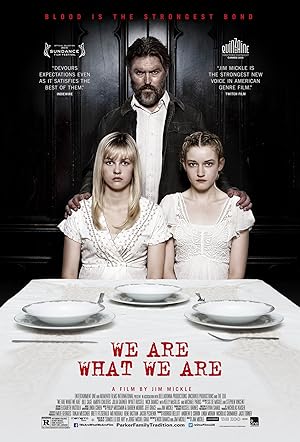I’ve been a huge Jim Mickle and Nick Damici fan since Mulberry Street and Stake Land so it was inevitable that I would eventually watch We Are What We Are (2013), which is a remake of Somos lo que hay or We Are What We Are (2010), a Mexican film. Actually it seems unfair to classify We Are What We Are (2013) as a remake. Mickle and Damici take the premise, relocate it literally and psychologically in America, provided more historical and scientific explanation, fleshed out and completely switched the gender and ages of the characters, made it less frustrating for horror fans by providing a sufficient amount of gore and created a deliberate and thoughtful movie that would work equally well without the sensational premise. The film focuses on a seemingly conservative and deeply religious family. This family has a lot of property and lives far away from the town in Upstate NY. Their dress and manner are a little off-perhaps they would not stand out at a different time, but nothing is so noticeable to the outside world that it would cause alarm. In the U.S., it is unfortunately quite customary to write some family off as strange when God knows what is happening behind closed doors and for how long until somehow something emerges. In this case, both time and water (there is a flood), God’s major elements, finally made the ground cry out. The elements appear to always be against this particular family, who seem compelled to exile themselves from the rest of humanity-Cain, anybody? Some people complained that Mickle and Damici are always demonizing Christians. Who are these people? The family uses the trappings of Christianity to cloak their nefarious ceremonies. Don’t waste your time defending something that hopefully does not resemble anything that you do, and if it does resemble something that you do, turn yourself in to the police. Mickle and Damici have taken the noble task of exposing hypocrisy within all bureaucracies, including families and their religious traditions, while refusing to negate these hypocrites’ humanity-they love, feel guilt and rationalize survival. “Woe unto you, scribes and Pharisees, hypocrites! for ye are like unto whited sepulchres, which indeed appear beautiful outward, but are within full of dead men’s bones, and of all uncleanness.”-Matthew 23:27. We Are What We Are (2013) is also about family abuse-how it can sometimes seem normal, become part of a family tradition, is enforced by isolation and feel like damnation for speaking out against the family and that tradition. It isn’t an accident that they are against going to doctors and are not part of any community except through economic necessity-not even a church. The movie also condemns how people ineffectively intervene or stay on the sidelines instead of trusting their instincts that something is seriously wrong. As Americans, we do have an idea that people can do whatever they want on their property and do whatever they want with their kids then express horror at the results. How many serial killers have families? Neighbors? What effect does this violence have on the community? I am not sure if the end of the film worked with everything that happened before even though it may have felt cathartic. One minute a person can barely move, and the next, that person is running around killing people and dogs off screen. I think that We Are What We Are (2013) improves upon repeat viewing.





